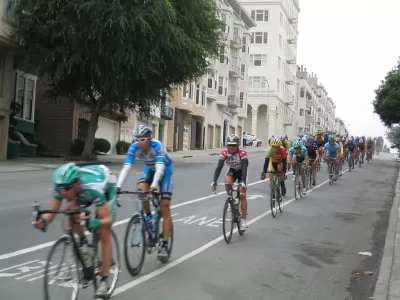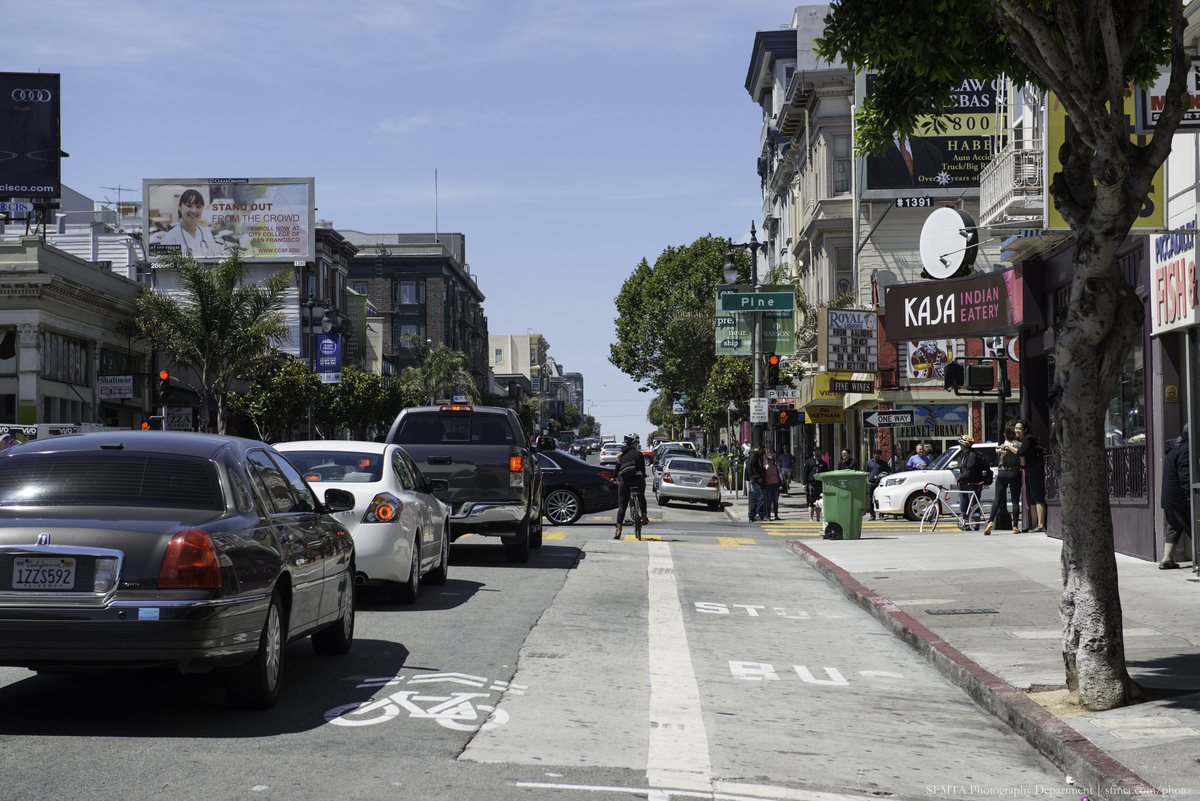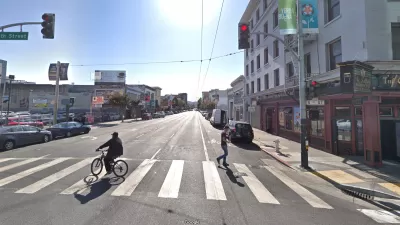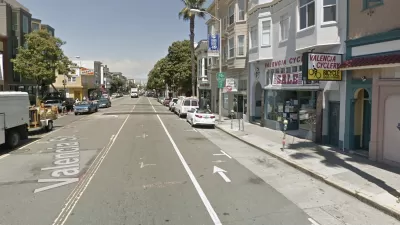The San Francisco Municipal Transportation Agency voted 6-0 on March 3 to approve a controversial plan to redesign 1.3 miles of Polk Street, one of the most dangerous corridors for biking and walking in The City. It only took 2.5 years.

"Debate over the embattled pedestrian- and bike-safety project, which drew criticism from businesses and cyclists alike, had stretched over 2½ years," writes Joe Fitzgerald Rodriguez for The Examiner. "In the end, neither side got everything it wanted."

Credit: SFMTA
At City Hall on Tuesday night, the SFMTA voted 6-0 to approve the hybrid plan for the 20 blocks north of McAllister Street [McAllister Street is on north perimeter of City Hall] to Union Street, split into two sections: McAllister to Pine Street, and Pine to Union Street [see Streetsblog image]. The lower two blocks won the coveted 2014 bike award from People for Bikes.
The approved plan will result in a raised, protected bike lane on northbound Polk Street from McAllister to Pine streets, a morning commute-only bike lane from Pine to Broadway, high visibility crosswalks, sidewalk bulbouts, bus stop consolidation and more, at a cost of $8 million.
"From 2006-11 there were 122 collisions on the small stretch of Polk alone, equating to two collisions per month, advocates say," writes Rodriguez. "In public comment, Nicole Schneider of advocacy group Walk San Francisco recalled the car collision death of 6-year-old Sofia Liu on Polk Street on New Year's Eve 2013, a reminder that brought a hush to the room."
As San Francisco Chronicle's transportation reporter, Michael Cabanatuan, wrote before Tuesday's meeting, "(t)he plan that MTA planners devised could be described as a compromise that leaves no one happy. But Tom Maguire, the agency’s sustainable streets director, insists the goal has been safety in keeping with the city’s commitment to Vision Zero, an effort to eliminate traffic-related fatalities by 2020."
The packed meeting attracted seventy speakers from both sides—those wanting fully protected bike lanes on both sides of the 20 blocks to Union Street [also see Steetsblog's Aaron Bialick's piece on the "watered-down" plan, and neighborhood business people and residents, particularly from nearby Russian Hill, who were opposed to the loss of 140 parking spaces. [See Planetizen blogger Ian Sac's piece on this aspect of the controversy].
In the end, SFMTA planner Luis Montoya's compromise plan survived as presented after an unsuccessful amendment by SFMTA Vice Chairman Cheryl Brinkman to "continue to plan for a continuous protected bike lane on the east side of the narrow, busy street," writes Cabanatuan.
"Construction is scheduled to start in 2016 and last about 18 months," adds Cabanatuan.
FULL STORY: Long battle results in protected bicycle lanes for Polk Street

Manufactured Crisis: Losing the Nation’s Largest Source of Unsubsidized Affordable Housing
Manufactured housing communities have long been an affordable housing option for millions of people living in the U.S., but that affordability is disappearing rapidly. How did we get here?

Americans May Be Stuck — But Why?
Americans are moving a lot less than they once did, and that is a problem. While Yoni Applebaum, in his highly-publicized article Stuck, gets the reasons badly wrong, it's still important to ask: why are we moving so much less than before?

Research Shows More Roads = More Driving
A national study shows, once again, that increasing road supply induces additional vehicle travel, particularly over the long run.

Which US Rail Agencies Are Buying Zero-Emissions Trains?
U.S. rail agencies are slowly making the shift to zero-emissions trains, which can travel longer distances without refueling and reduce air pollution.

San Diego School District Approves Affordable Housing Plan
The district plans to build workforce housing for 10 percent of its employees in the next decade and explore other ways to contribute to housing development.

Lawsuit Aims to Stop NYC’s ‘City of Yes’ Zoning Reforms
A lawsuit brought by local lawmakers and community groups claims the plan failed to conduct a comprehensive environmental review.
Urban Design for Planners 1: Software Tools
This six-course series explores essential urban design concepts using open source software and equips planners with the tools they need to participate fully in the urban design process.
Planning for Universal Design
Learn the tools for implementing Universal Design in planning regulations.
City of Moreno Valley
Institute for Housing and Urban Development Studies (IHS)
City of Grandview
Harvard GSD Executive Education
NYU Wagner Graduate School of Public Service
City of Cambridge, Maryland
Newport County Development Council: Connect Greater Newport




























